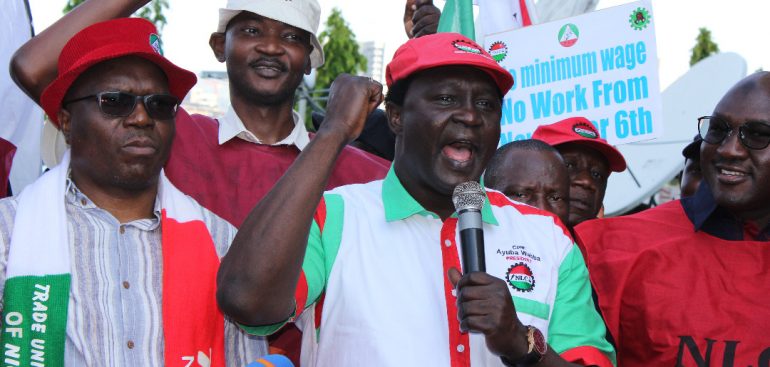1st June 2020

THE NIGERIA LABOUR CONGRESS SUPPORTS TOTAL COMPLIANCE TO THE CONSTITUTIONAL PROVISIONS ON AUTONOMY FOR STATES JUDICIARY AND LEGISLATURE
The Nigeria Labour Congress commends the Executive Order 10 issued on May 22, 2020 by the President and Commander-in-Chief of the Armed Forces of Nigeria, President Muhammadu Buhari, GCFR. The Executive Order 10 which is primed at promoting Section 121 (3) of the 1999 Nigerian Constitution is a step forward towards deepening the democratic process and good governance in the Federal Republic of Nigeria. The Executive Order 10 makes it mandatory for state governments to include the allocation of the judiciary and legislative arms of government as first line charges in their annual budgets.
The history of arm-twisting and abuse of the judiciary and legislative arms of government at the sub-national level in Nigeria is a long one. It had only gotten worse in recent years. The legendary distortion of due process, checks and balances, and public accountability which are the core ingredients in the principle of separation of powers got to a head when legislators in some of the State Houses of Assembly rejected constitutional proposals to grant them financial autonomy during the constitutional review process led by the 7th National Assembly.
The asphyxiation of the legislative and judiciary arms of government at the state level and the increasing concentration of powers in the hands of the executive arm of government should be of great concern to every Nigerian. According to the French philosopher, Baron de Montesquieu, the fundamental aim of the principle of separation of powers is to ensure that no arm of government usurps total power. This is what Section 121 (3) of Nigerian 1999 Constitution seeks to promote. The last constitution amendment led by the 8th National Assembly and assented into law by President Muhammadu Buhari on June 8, 2018 seeks to put an end to executive meddlesomeness at the state level.
We need to emphasize the point that strong legislative and judiciary institutions of government are the strong pillars of democracy and good governance. A resilient judiciary and a conscientious legislature are therefore sine qua non to the deepening of the democratic process, promotion of public accountability and ensuring popular participation.
It is pertinent also to note that it is the collective duty of our political leaders at all levels to uphold, promote and sustain the virility of our public institutions especially the legislative and judiciary arms of government. The truth is that if our political leaders were alive to this duty, there would not have been any need for the Presidential Implementation Committee set up on March 22, 2019. This was almost one year after Section 121(3) had been assented into law and at least the exercise of one budget cycle. Furthermore, until the release of Executive Order 10, there were very little signs to show seriousness on the part of state governors to comply with the clear demands of Section 121 (3) of our constitution. This is a direct violation of the oath sworn by our state governors to uphold the Nigerian Constitution at all times.
In the interest of good governance, strengthening of the principle of separation of powers national stability, and overall development of Nigeria, we urge political leaders at every level to respect the wishes of the Nigerian people and allow the full exercise of financial autonomy for the judiciary and legislature in the states. Democracy must remain the government of the people, by the people, and for the people.
Comrade Ayuba Wabba, mni
President

